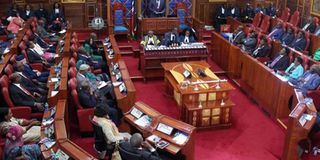Senators usurped role of MCAs, study says

Senate Speaker Ken Lusaka gives his acceptance speech at Parliament Buildings on August 31, 2017. Senators have been doing the job of the Members of County Assemblies (MCAs). PHOTO | DENNIS ONSONGO | NATION MEDIA GROUP
What you need to know:
- The study proposes that the senators should focus on issues that affect all counties, and come up with a solution.
- The Senate continues to take refuge in a pronouncement by the courts that the Senate could summon governors.
Kenya’s Senate overstepped its mandate when it began summoning each of the 47 individual governors to Nairobi’s Parliament Buildings seeking responses to audit queries, a new study says.
The paper, published in the latest issue of the Africa Journal of Comparative Constitutional Law, has slammed the senators for ignoring a judicial call for restraint when reviewing the expenditure of billions allocated to the counties.
The paper says that the senators’ obsession with pursuing audit queries in the counties had not only distracted the Senate from its core mandate, but had also neutered the role of county assemblies in checking the expenditure of the county executives.
OVERSIGHT
Put another way, the senators were doing the job of the Members of County Assemblies (MCAs).
“The exercise of the oversight role, as approached by the Senate, comes with extra resources to execute it.
"As such, it is an additional incentive for the senators to push for an interpretation of article 96(3) of the Constitution that allows them to visit counties and carry out the oversight,” the study conducted by Dr Conrad Bosire, currently a Postdoctoral Research Fellow at the University of Western Cape, South Africa, reads.
The paper cites dozens of archival information, court and parliamentary documents, and even research by other Kenyan scholars with expertise in devolution and has come to the conclusion that the Senate had no business setting up a specific committee to ask governors to explain audit queries.
It is a waste of public money.
“County assemblies and the Parliamentary Service Commission have already set aside funds for committee meetings and, therefore, the county-level oversight is an additional strain on limited public resources,” the study notes.
ALLOWANCES
Whenever governors travel to Nairobi, they have to cater for accommodation for themselves in five-star hotels in the city, that of their drivers, bodyguards and aides.
They also pay for their senior officers who handle the operations in the counties to join them in the committee meetings.
And because they will all be working out of station, they end up pocketing hundreds of thousands in daily allowances.
With important officers out of the county, business is crippled.
Furthermore, the senators who sit in the County Public Accounts and Investments Committee also pocket money in allowances.
EQUITABLE SHARE
Instead of protecting counties, the paper notes, the Senate was undermining the spirit of devolution.
“The sheer magnitude of the oversight work, as contemplated by the Senate, will clearly overburden it and it will certainly not be effective in the long run,” the study says.
The study also indicts the Senate for not finding a way to force the National Treasury to ensure the county governments get their money on time.
While noting the well-documented challenges in the aptitude of members of county assemblies to check the County Executive, the study says the Senate is engaged in a vain job, because even if it finds malfeasance in county expenditure, it has no way of enforcing its sanctions without undermining devolution.
“A County Assembly has an array of measures that it can take against the lower-level executive.
"These include a refusal to approve appointments, budgets, plans or legislation.
"Indeed, the county assembly can cause an ‘American-like government shutdown’ in order to force the lower-level government to account.
"The county assembly can also start impeachment proceedings if transgressions of the executive reach the requisite threshold.
"While the Senate may scrutinise audit reports, it has no powers to deal directly with the county executive in a manner similar to that of county assemblies,” the paper records.
SOLUTIONS
Besides, the study proposes that the senators should focus on issues that affect all counties, and come up with a solution, instead of going county by county addressing similar weaknesses.
The Senate continues to take refuge in a pronouncement by the courts that the Senate could summon governors.
But the new paper argues it has no capacity nor locus standi to make meaningful intervention.
“The Senate is a part of Parliament, an organ of national government. Accordingly, it is not possible for the Senate to play a legislative role with regard to counties,” the paper reads.
This position echoes a similar one held by prominent devolution scholar Mutakha Kangu in his book Constitutional Law of Kenya on Devolution.
To buttress this position, the paper cites the episode when Kiambu MCAs reached out to the Senate to stop then governor William Kabogo from signing a bill into law.
The courts ruled the Senate had no such powers.
Similarly, when Kisumu MCAs pleaded with the Senate to stop disbursements to the county, the Senate admitted that it had no such powers.
SENATORS
Dr Bosire dug into the history of the independence constitution that had a Senate and regional governments, and found that even then, the Senate did not have the authority to supervise regional governments.
“Senators generally view county governors more as political rivals than as collaborators or partners in the pursuit of the collective interests of county governments,” the paper notes.
It goes on: “Consequently, relations between the directly elected senators and county governors have been characterised by hostility and competitive politics rather than a consultative and collaborative approach as envisaged by the Constitution.”
It is that rivalry that came to the fore in the 2017 elections that could partly explain why at least 10 senators vied for the gubernatorial seat, of which six were elected.




